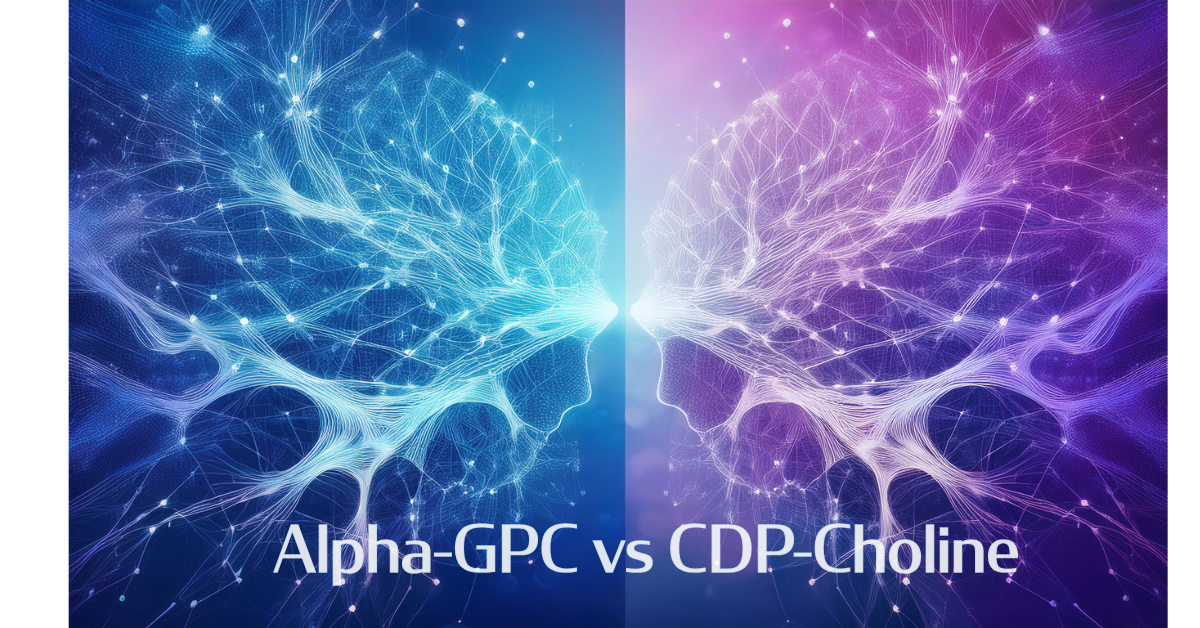Choline and Brain Health: Why This Essential Nutrient Boosts Memory, Focus, and Cognitive Resilience
What is Choline?
Choline is an essential nutrient that your body and brain need to function properly.
Although choline is often grouped with B-vitamins because of its role in metabolism and cellular health, it’s actually a unique nutrient. It plays a critical role in both brain chemistry and cell structure.
Your body can make small amounts of choline on its own, but not enough to meet your needs. That’s why choline must come primarily from your diet or supplements.
Without enough choline, your brain cells can’t communicate properly — which can impact memory, focus, and even mood.
Why Your Brain Needs Choline
Choline is vital for keeping your brain sharp, flexible, and resilient. It supports three major processes that are essential for cognitive health:
1. Building Brain Communication Molecules (Neurotransmitters)
Choline is the direct raw material for making acetylcholine — the brain’s key chemical messenger for:
- Memory formation
- Learning new skills
- Sustaining attention
- Regulating mood and motivation
Without enough choline, communication between brain cells slows down, making it harder to think, focus, and remember new information.
2. Creating and Maintaining Brain Cell Membranes (Phospholipids)
Choline is a critical ingredient in phosphatidylcholine (a major building block of brain cell membranes).
Healthy brain cell membranes are essential for:
- Quick, efficient signal transmission
- Protecting neurons from stress and injury
- Allowing brain cells to adapt, grow, and form new connections (neuroplasticity)
Strong, flexible membranes help your brain process information faster, adapt better to challenges, and stay resilient over time.
3. Supporting Methylation and DNA Protection
Choline also provides methyl groups — small chemical tags that help regulate gene expression, repair DNA, and maintain the brain’s long-term health.
Efficient methylation is crucial for:
- Healthy brain development
- Protecting neurons from damage
- Reducing long-term risks of cognitive decline
💡 Quick Fact: Studies show that people with higher choline intake perform better on memory and learning tests — even when they're young and healthy.
How Much Choline Do You Need Each Day?
Even though choline is essential for brain health, many people don’t get enough through their diet.
Here are the recommended daily amounts for choline:
- Adult men (19+ years): 550 mg per day
- Adult women (19+ years): 425 mg per day
- Pregnant women: 450 mg per day
- Breastfeeding women: 550 mg per day
(These values are based on the Dietary Reference Intakes adopted by Health Canada.)
Unfortunately, studies show that most Canadians — like many people worldwide — fall short of these targets. In fact, research suggests that over 90% of North Americans do not meet the recommended daily intake for choline.
Pregnant women are particularly at risk, even though choline is vital for healthy fetal brain development.
Because food sources of choline (like eggs, meat, and fish) aren’t always eaten regularly — especially in modern, plant-heavy or low-fat diets — it can be challenging to meet daily needs without extra support.
Who’s at Higher Risk for Low Choline Levels?
Some groups have a harder time getting enough choline from food alone, including:
- Vegetarians and vegans (plant-based diets are typically lower in choline)
- Pregnant and breastfeeding women (higher demands for fetal and infant brain development)
- People on low-fat or low-cholesterol diets (choline-rich foods like eggs and liver are often avoided)
- Older adults (reduced absorption and higher needs for brain protection)
- Individuals with certain genetic variations (such as PEMT gene mutations that impair choline metabolism)
Best Food Sources of Choline
While your body makes a small amount of choline naturally, most of your choline needs must come from your diet.

💡 Quick Tip: One egg provides about 25–35% of a woman's daily choline needs — making eggs one of the easiest and most affordable ways to boost your intake.
However, relying on diet alone can sometimes be challenging, especially for people following plant-based diets, eating low-fat, or simply not consuming enough choline-rich foods daily. That’s where strategic supplementation can play a valuable role in meeting your brain’s needs consistently.
When and Why to Consider Choline Supplementation
While a healthy diet is the foundation of brain health, many people still struggle to get enough choline from food alone — even with the best intentions.
There are a few reasons why:
- Modern diets often limit foods that are naturally high in choline, such as eggs, liver, and fatty fish.
- Plant-based and low-fat diets tend to provide lower amounts of choline overall.
- Pregnancy, aging, and high cognitive demands increase choline requirements, making it harder to meet daily needs through food alone.
- Genetic factors can impair the body’s ability to produce or utilize choline efficiently.
💡 Quick Fact: Even eating two eggs a day would only provide about half the recommended daily intake for men.
This is where supplementation can make a real difference. Targeted supplements provide a reliable, concentrated source of brain-ready choline that supports memory, focus, and long-term cognitive health — without having to overhaul your entire diet.
What is CDP-Choline and How Does It Support Your Brain?
CDP-choline, also known as Citicoline, is a highly bioavailable form of choline that’s specifically designed to support brain health.
Unlike regular dietary choline, CDP-choline is a precursor molecule made of two components:
- Choline — the building block for acetylcholine (memory, learning, attention)
- Cytidine — a molecule that converts into uridine in the brain, helping build and repair brain cell membranes
When you take CDP-choline, your body rapidly absorbs both choline and cytidine, delivering them directly to the brain where they are needed most.
💡 Quick Fact: CDP-choline is naturally found in the body, but supplemental forms are used to boost brain levels more efficiently and consistently.
The unique benefits of CDP-choline include:
- Boosting memory and learning: Increases acetylcholine levels in the brain, improving memory formation and cognitive processing.
- Supporting brain cell health: Enhances phospholipid synthesis to repair and strengthen brain cell membranes.
- Promoting neuroprotection: Helps protect neurons from oxidative stress and age-related damage.
- Improving attention and focus: Clinical studies show CDP-choline supplementation can enhance sustained attention and mental clarity.
Because CDP-choline is able to efficiently cross the blood-brain barrier, it is considered one of the most effective and well-researched forms of choline for cognitive support.
Why We Chose CDP-Choline for eudopa™
(Now for the shameless supplement plug you knew was coming.)
At NeuroVesa, we’re serious about brain health — but we’re not above admitting that yes, this is the part where we tell you about the supplement we created to help you get more choline (and a lot more brain support, too).
When we designed eudopa™, our goal was simple: create a brain health formula that supports memory, focus, and long-term cognitive resilience using the best available science.
That’s why we selected CDP-choline as one of the core ingredients.
Here’s why CDP-choline stood out:
- Superior bioavailability
- Comprehensive brain support
- Extensive research backing
- Proven safety profile
💡 Quick Fact: CDP-choline supplementation has been shown to enhance memory performance in healthy adults — not just in those with cognitive decline.
At NeuroVesa, we believe that foundational brain health starts with giving your mind the nutrients it truly needs to thrive. By including CDP-choline in eudopa™, we’ve created a smarter, science-driven way to support your cognitive potential every day.
Conclusion
Choline is one of the most important — yet often overlooked — nutrients for brain health, cognitive performance, and long-term neurological resilience.
By understanding how choline powers your memory, focus, brain cell structure, and even genetic health, you can take proactive steps to support your mind at every stage of life.
While a balanced diet rich in choline-containing foods is essential, supplementation with clinically backed forms like CDP-choline offers a reliable, effective way to ensure your brain gets the support it needs to thrive.
At NeuroVesa, we created eudopa™ to make it easy to invest in your brain’s future, using science-driven ingredients you can trust.
Your brain deserves the best — and it all starts with giving it the right building blocks today.
References
- Zeisel SH, da Costa KA. (2009). Choline: An essential nutrient for public health. Nutrition Reviews, 67(11), 615–623. https://doi.org/10.1111/j.1753-4887.2009.00246.x
- Institute of Medicine (US) Standing Committee on the Scientific Evaluation of Dietary Reference Intakes. (1998). Dietary Reference Intakes for Thiamin, Riboflavin, Niacin, Vitamin B6, Folate, Vitamin B12, Pantothenic Acid, Biotin, and Choline. National Academies Press. https://doi.org/10.17226/6015
- Niculescu MD, Zeisel SH. (2002). Diet, methyl donors and DNA methylation: interactions between dietary folate, methionine and choline. The Journal of Nutrition, 132(8 Suppl), 2333S–2335S. https://doi.org/10.1093/jn/132.8.2333S
- Blusztajn JK, Wurtman RJ. (1983). Choline and cholinergic neurons. Science, 221(4611), 614–620. https://doi.org/10.1126/science.6186400
- USDA FoodData Central. Choline content of selected foods. United States Department of Agriculture. https://fdc.nal.usda.gov/
- Health Canada. (Updated 2023). Dietary Reference Intakes Tables. Government of Canada. https://www.canada.ca/en/health-canada/services/food-nutrition/healthy-eating/dietary-reference-intakes/tables.html
- Secades JJ. (2020). Citicoline: Pharmacological and clinical review, 2020 update. Revista de Neurología, 70(11), 469–489. https://doi.org/10.33588/rn.7011.2020172


